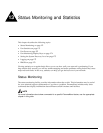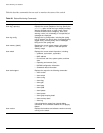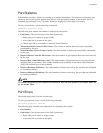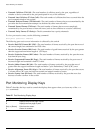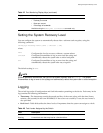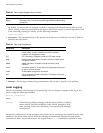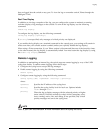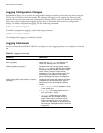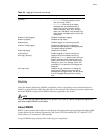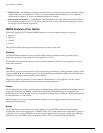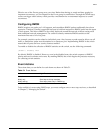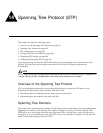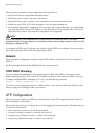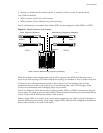
178 Summit 200 Series Switch Installation and User Guide
Status Monitoring and Statistics
Logging Configuration Changes
ExtremeWare allows you to record all configuration changes and their sources that are made using the
CLI by way of Telnet or the local console. The changes are logged to the system log. Each log entry
includes the user account name that performed the change and the source IP address of the client (if
Telnet was used). Configuration logging applies only to commands that result in a configuration
change. To enable configuration logging, use the following command:
enable cli-config-logging
To disable configuration logging, use the following command:
disable cli-config-logging
CLI configuration logging is enabled by default.
Logging Commands
Use the commands described in Table 50 to configure or reset logging options, or to display or clear the
log.
Table 50: Logging Commands
Command Description
clear counters Clears all switch statistics and port counters.
clear log {static} Clears the log. If static is specified, the
critical log messages are also cleared.
config log display {<priority>} Configures the real-time log display. Specify
the priority option to filter the log to display
messages with the selected priority or higher
(more critical). Priorities include critical,
emergency, error, alert, warning, notice, info,
and debug. If not specified, informational
priority messages and higher are displayed.
config syslog {add} <host name/ip> <facility>
{<priority>}
Configures the syslog host address and filters
messages sent to the syslog host. Up to 4
syslog servers can be configured. Options
include:
• host name/ip—The IP address or name
of the syslog host.
• facility—The syslog facility level for
local use (local0 - local7).
• priority—Filters the log to display
messages with the selected priority or
higher (more critical). Priorities include
critical, emergency, alert, error, warning,
notice, info, and debug. If not specified, only
critical priority messages and are sent to the
syslog host.




